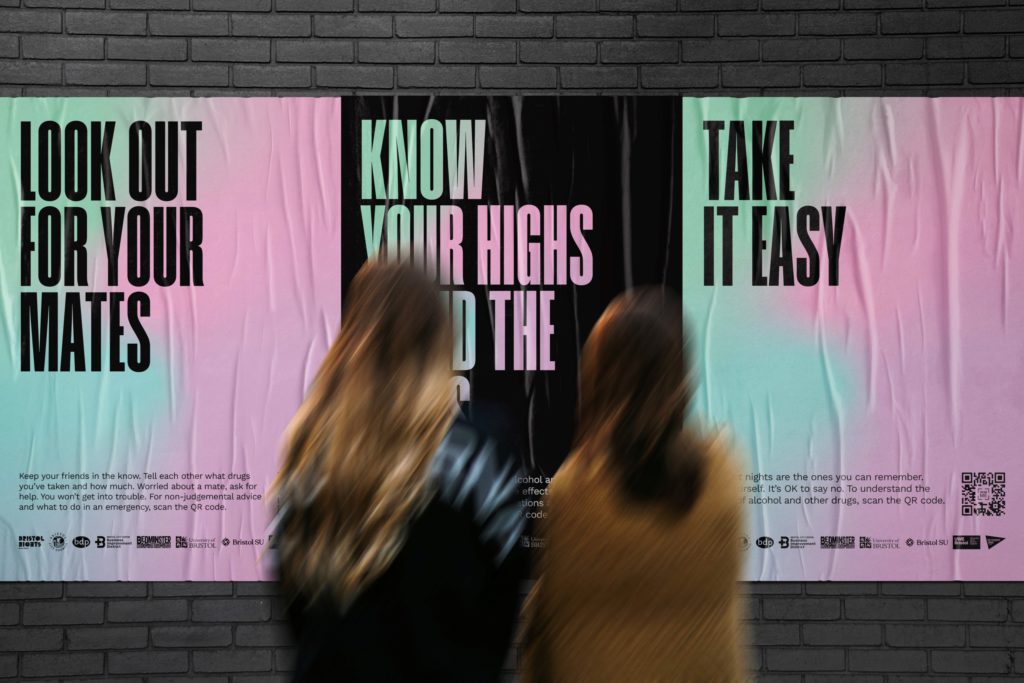Efforts to reduce the harm caused by drugs and alcohol in the night time economy have received a boost today with the launch of a campaign aimed at promoting safety in the sector.
[button open_new_tab=”true” color=”accent-color” hover_text_color_override=”#fff” size=”jumbo” url=”https://projects.bristolnights.co.uk/harm-reduction” text=”VISIT BRISTOL NIGHTS” color_override=””]
This latest campaign from Bristol Nights, in partnership with local agencies and charities, sets out a plan to introduce a safety-first approach towards drug and alcohol use in Bristol. This approach is one that encourages people to recognise the risks of drug and alcohol use and aims to equip everyone involved in the night time economy with the information and tools required to promote safe environments.
To support this plan, a practical guide has been produced to help venues, event promoters, festival organisers, security/door staff and others who work in the sector, help make sense of the legislative landscape and help people know what to do in an emergency. Above all, the guide aims to provide people with the knowledge needed to ensure any and all action taken from a policy level down to the individual actions of staff prioritises harm reduction.
Councillor Ellie King, Cabinet Member for Public Health, Communities and Bristol One City, said:
“Competing drug and alcohol policy approaches across the country have led to a situation where too often the response taken by various agencies, venues and support services can seem confused and disjointed. What we’re trying to deliver in Bristol is a cohesive, human-centred and inclusive approach that recognises drug and alcohol consumption as part of modern society and takes positive action to tackle damaging behaviours whilst prioritising the reduction of harm to individuals and communities.
“We have a well-deserved reputation for our diverse, exciting nightlife and we want everyone to be able to enjoy it safely. From the busy bars of the harbourside to our cosy local pubs or our vibrant nightclubs, safety in the night time economy is a priority for all in the sector. To achieve this, we have to introduce change to ensure we’re embedding harm reduction at all levels and dispelling the myths and assumptions that prevent people accessing effective and timely care, which ultimately can cost lives.
“This campaign also demonstrates the powerful partnerships we have forged in the city and the results we can achieve by working together. I am grateful to all who have contributed to this work, in particular those from within the night time economy who have helped shape the practical support being offered and will play such a critical role in driving change across the sector.”
Harm reduction is described as a human-centred approach, focusing on providing judgement-free solutions to lower the risks of behaviours surrounding drugs and alcohol whilst supporting people to access support and accurate advice. A harm reduction stance does not mean anti-social or criminal behaviour is acceptable, any such misconduct should continue to be addressed robustly. Substance use is not to be regarded as the same as being involved in the supply of illegal drugs. Any person found to be involved in the supply of illegal drugs should be referred to Avon and Somerset Police.
Carly Heath, Bristol’s Night Time Economy Advisor, said:
“Bristol’s 6pm-6am economy encompasses the soul of the city after dark. The sector employs a third of the city’s workforce and is home, for one night, to thousands of people that make up our customers and audiences. It’s also a sector that has, for too long, been subject to policy approaches that have not supported people to deliver safe and inclusive environments nor take positive action to protect the wellbeing of all involved in the night time economy. Our aim is to change that direction and provide the support and guidance venues, operators and staff need to make our nightlife experience the safest it could possibly be
“Drug and alcohol use in the night time economy can be a challenging conversation to have, but it’s not one to shy away from. As someone who has worked in the sector for many years, I have seen first-hand the avoidable tragedies from alcohol and drug related harm. Many of those failures come from poor policy decisions imposed on premises by “Zero Tolerance”, and the legacy of this outdated point of view means that licensees are nervous of talking about the negative effects of drugs and alcohol. For harm reduction to become our stock position it’s important we have a challenging conversation about drug and alcohol consumption. Bristol is a city with collaboration at its heart, and this work demonstrates the strength of our partnerships to overcome challenging conversations and focus on the key objective – to keep people safe.
“This campaign doesn’t stand alone and links in with other work we’ve undertaken, and activity being delivered by others, to shape a progressive approach to safety in the night time economy. We’re building on the successes of our multi-venue campaigns around Drink Spiking, taking a zero- tolerance approach to sexual harassment, the delivery of a Women’s Safety Charter, and the student safety campaign “Bristol Rules”. We will soon be joined in the city by The Loop drug checking service, the country’s first regular service of its kind, whose approach combines the provision of personalised health advice with drug testing.
“I hope that through this coordinated approach to address harm reduction, we can better look out for our patrons, reduce the risk of harm and help save lives.”
Further information about the campaign and further advice and guidance can be found on the Bristol Nights website.
About Bristol Nights:
Bristol’s night-time economy incorporates all businesses who operate between 6pm-6am. It supports over 91,000 jobs, a third of the city’s workforce.
Bristol is a thriving and innovative global city and home to a wealth of cultures and creative ideas. At least 91 different languages are spoken by Bristol residents, and the city continues to build on its strengths as a place welcoming:
- 1,127 Night-time economy premises
- 340 Restaurants
- 286 Public houses
- 158 Café bars
- 107 Takeaways
- 81 Social Clubs
- 52 Hotels
- 46 Open air spaces
- 13 Breweries
- 12 Music venues
- 5 Theatres
- 27 Nightclubs
- Employing 91,680* people across Bristol – that’s a third of the population
*Employed in Bristol between the hours of 5pm and 6am
Supt Mark Runacres, Area Commander for Bristol, said:
“Reducing the harms caused by drugs will be best achieved through working in partnership across agencies, organisations, businesses and communities. The police commitment to tackling drugs through enforcement interventions remains strong, but we are also recognise the importance of working together to reduce the wider harms that drugs cause. Through this campaign we support the efforts of our partners to keep people safe and we are committed to working together to reduce drug use and minimising the harms that are caused.”
Alison Golden, Director of Student Health and Inclusion at the University of Bristol, said:
“We know that some young people, including students, are going to use alcohol and other drugs. If they choose to do so, the best we can do to try and keep them safe is make sure they have access to information and advice. Taking a zero-tolerance approach actually causes more harm because we know it prevents young people from reaching out for help for fear of being reprimanded.
“Here at the University of Bristol we want young people to be educated about drugs and alcohol, to know the risks and dangers and, importantly, where they can go for help and support if they need it. “One example of how we’re doing this is a joint project with our Students’ Union and Bristol Drugs Project where students are given harm reduction advice and are shown how to use testing kits to determine that the drugs they are planning to take are what they think they are and not cut with something harmful.
“As an institution we believe that a harm reduction stance is in the best interests of our students and reduces barriers to accessing support. Not only is support important but having accurate and useful advice is essential to reducing harm.
“All of this does not mean anti-social or criminal behaviour is acceptable. Such misconduct will continue to be addressed robustly through our disciplinary regulations and any student found to be involved in the supply of illegal drugs will be referred to the University’s Police Officer.”
Sorcha Ryan, Club and Festival Harm Reduction Lead at the Bristol Drugs Project, said:
“BDP has been delivering harm reduction services in the night time economy for many years, so we fully support this campaign and the city-wide shift towards safer nightlife that it represents.
“Zero-tolerance approaches to drug use in the night time economy are ubiquitous in the UK. With drug and alcohol deaths rising year-on-year, this collaborative project is both needed and timely. We welcome the breadth of organisations involved in the project. To be effective, an approach like this needs complete buy-in from all parties operating in the night time economy, including the police, licensing bodies and venues.
“We are particularly pleased to have contributed to the Harm Reduction Handbook element of the project, which is designed to provide guidance on managing drug use and drug-related emergencies for venues and their staff. Venues, and the people who work in them, often represent the first line of response in medical emergencies, so ensuring these individuals are confident to respond is vital for keeping people safer.
“The project presents a unique opportunity for Bristol to tackle some of the unintended consequences of a zero-tolerance approach, such as people feeling unable to access medical support in a drink/drug-related medical emergency due to fear of punishment. We hope this city-wide campaign will empower venues to prioritise the safety of their customers, encourage people who use the night time economy to look out for each other and support people to make safer decisions about their use of alcohol and other drugs.”





